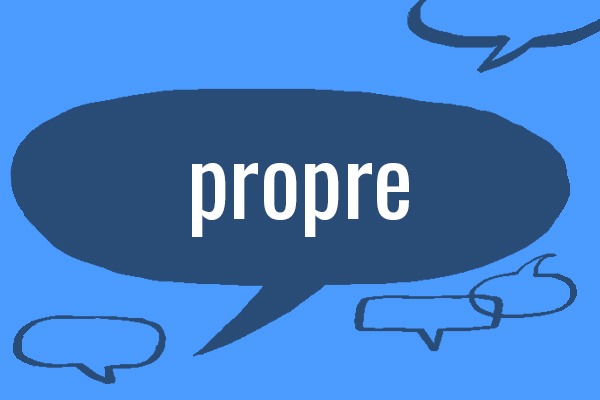It’s time again for your weekly dose of French to help you improve your vocabulary and understanding. This week, we’re looking at the word propre.
Check out the audio clip below to hear how a native French speaker would say propre:
Now that you’re able to properly pronounce propre (try saying that in a hurry!), it’s time to find out what it means in English. You might think that the last sentence had a clue in it – but propre does not mean ‘proper’ or ‘properly’! It can be translated clean, neat, or used when describing something of your own.
The word has two different grammatical functions: it can be used as an adjective or as a noun. You use propre in different ways in a sentence depending on its function and what you want it to mean, as you’ll see in the examples below.
Firstly, let’s see how it works as an adjective to mean clean, neat or tidy. In these cases, you’ll notice it comes after whatever noun it is describing:
Il faut avoir les mains propres avant de cuisiner. It’s necessary to have clean hands before cooking.
As-tu un autre verre ? Celui-ci n’est pas propre. Do you have another glass? This one isn’t clean.
« Cette salle est très propre. » « Oui, je viens de la ranger. » “This room is very neat.” “Yes, I’ve just tidied it.”
l’énergie propre (f) clean energy
le sens propre / au sens propre (m) literal meaning; literally
In the next group of examples, we’ll see how the adjective can also mean own.It might help to remember this by thinking about the English word property. In these cases, it comes before the noun:
pour son propre compte for one’s own benefit
de ses propres mains with one’s own hands
Chacune de mes filles a ses propres enfants. Each of my daughters has their own children.
Au lieu de lire l’article, Diego a voulu partager son propre avis. Instead of reading the article, Diego wanted to share his own opinion.
Another adjectival usage that is worth learning is the set phrase propre à:
propre à specific to
Il te faut des médicaments propres à soulager la nausée. You need some medicine specifically for alleviating nausea.
In the final set of examples, we’ll look at the use of propre as a masculine noun. This often translates as characteristic, or peculiarity:
être le propre de to be unique/specific to
Son style de cinématographie est le propre de l’année 1970. Her style of cinematography is unique to the year 1970.
mettre quelque chose au propre to finalise a draft/copy of something
Keep up your French learning – you’ll soon be able to create your very own list of vocabulary and grammar you’ve learned about! We hope to see you here next week for another word.
Written by Holly Tarbet, freelance copywriter and editor.
All opinions expressed on this blog are those of the individual writers, and do not necessarily reflect the opinions or policies of Collins, or its parent company, HarperCollins.




collins_dictionary_official
The home of living language. #wotd #wordlovers #collinsdictionary
Read our word of the week definitions and blog posts: